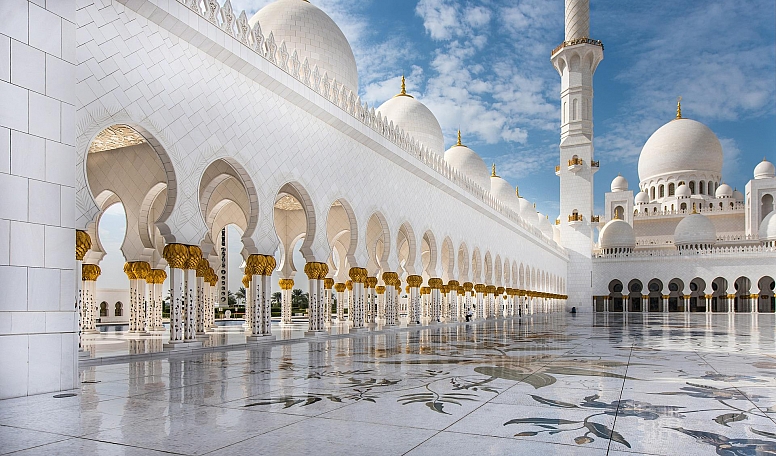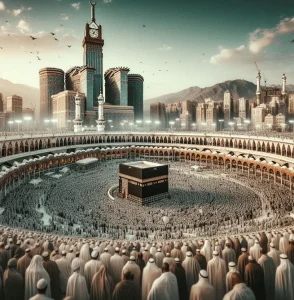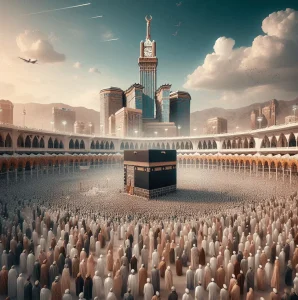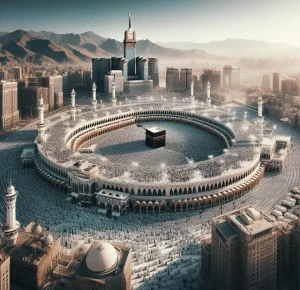Table of Contents
Must Visit Muslim Destinations Embark on a captivating journey through time and faith as we explore some of the Must Visit Muslim Destinations around the world. These sacred sites not only hold immense religious significance but also offer profound insights into Islamic history, architecture, and cultural heritage. From ancient cities to majestic mosques, each destination invites travelers to discover the rich tapestry of Islam’s legacy.

1. Mecca, Saudi Arabia
Mecca stands as the holiest city in Islam, revered as the birthplace of Prophet Muhammad (peace be upon him) and the site of the Kaaba, the most sacred sanctuary of Islam. Pilgrimage to Mecca, known as Hajj, is one of the Five Pillars of Islam and a dream for millions of Muslims worldwide.
Kaaba and Masjid al-Haram
- Kaaba: The focal point of the Hajj pilgrimage, Muslims from all corners of the globe gather here to perform Tawaf (circumambulation) around the Kaaba.
- Masjid al-Haram: The grand mosque surrounding the Kaaba is one of the largest in the world, accommodating millions of worshippers during Hajj and Umrah pilgrimages.
Mecca’s spiritual aura, coupled with its historical significance, makes it an essential destination for Muslims seeking to deepen their faith and connect with the roots of Islam.
2. Medina, Saudi Arabia
Medina, the city of the Prophet, holds a special place in Islamic history as the final resting place of Prophet Muhammad (peace be upon him). It is the second holiest city in Islam and a site of great religious and cultural importance.
Prophet’s Mosque (Masjid al-Nabawi)
- Prophet’s Mosque: Built by Prophet Muhammad (peace be upon him) himself, this mosque houses his tomb and remains a center of worship and scholarly learning.
- Green Dome: The iconic green dome marks the location of the Prophet’s tomb and is a symbol of spiritual reverence.
Visiting Medina allows Muslims to pay homage to Prophet Muhammad (peace be upon him) and experience the tranquility and spirituality that permeate this sacred city.
3. Jerusalem, Palestine
Jerusalem holds significance for Muslims as the site of the Al-Aqsa Mosque, the third holiest mosque in Islam. It is also home to the Dome of the Rock, a symbol of Islamic architecture and religious identity.
Al-Aqsa Mosque and Dome of the Rock
- Al-Aqsa Mosque: Muslims believe Prophet Muhammad (peace be upon him) was transported from Mecca to Jerusalem during the Night Journey (Isra and Mi’raj), making this mosque a place of profound spiritual significance.
- Dome of the Rock: Built atop the Temple Mount, it enshrines the Foundation Stone, believed to be where Prophet Muhammad (peace be upon him) ascended to heaven.
Jerusalem’s historical and religious importance makes it a cherished destination for Muslims seeking to explore the connections between faith, history, and spirituality.
4. Istanbul, Turkey
Istanbul, once known as Constantinople, served as the capital of the Ottoman Empire and is home to numerous stunning Islamic architectural marvels.
Sultan Ahmed Mosque (Blue Mosque) and Hagia Sophia
- Sultan Ahmed Mosque: Known for its striking blue tiles and six minarets, this mosque is an architectural masterpiece that continues to be a place of worship and reflection.
- Hagia Sophia: Originally a Christian cathedral, it was converted into a mosque during the Ottoman era and later into a museum. Recently, it has been reconverted into a mosque.
Istanbul’s blend of Islamic and Byzantine influences offers a unique perspective on the cultural and architectural achievements of Muslim civilizations.
5. Cordoba, Spain
Cordoba holds a significant place in Islamic history as a center of learning and culture during the medieval period in Muslim Spain (Al-Andalus).
Great Mosque of Cordoba (Mezquita)
- Great Mosque of Cordoba: Renowned for its iconic horseshoe arches and stunning interior, this mosque exemplifies the architectural brilliance of Islamic Spain.
- Mihrab and Minaret: The intricately decorated mihrab (prayer niche) and minaret showcase the artistic and spiritual achievements of Muslim artisans.
Cordoba’s rich Islamic heritage makes it a must-visit destination for those interested in exploring the interplay of Islamic, Christian, and Jewish cultures during Spain’s Golden Age.
6. Cairo, Egypt
Cairo, the capital of Egypt, boasts a wealth of Islamic architectural treasures dating back to various periods of Muslim rule.
Al-Azhar Mosque and Citadel of Cairo
- Al-Azhar Mosque: Founded in 970 CE, it is one of the oldest continuously operating universities in the world and a prestigious center of Islamic learning.
- Citadel of Cairo: Built by Salah al-Din (Saladin), it served as the seat of power for several dynasties and offers panoramic views of Cairo’s skyline.
Cairo’s bustling streets and historical landmarks provide a glimpse into the vibrancy and resilience of Islamic civilization in the heart of Egypt.
7. Samarkand, Uzbekistan
Samarkand, an ancient Silk Road city, flourished as a center of Islamic culture, scholarship, and architecture under the Timurid Empire.
Registan Square and Shah-i-Zinda
- Registan Square: Surrounded by three grand madrasas adorned with intricate tile work and calligraphy, it is a testament to Samarkand’s artistic and intellectual achievements.
- Shah-i-Zinda: A necropolis with stunning turquoise domes, it houses the mausoleums of Timurid princes and reflects the city’s spiritual and architectural legacy.
Samarkand’s UNESCO-listed monuments and vibrant bazaars beckon travelers to explore the legacy of Islamic civilization along the ancient Silk Road.
8. Granada, Spain
Granada is renowned for the Alhambra, a palatial fortress complex that embodies the pinnacle of Moorish architecture in Spain.
Alhambra Palace and Generalife Gardens
- Alhambra Palace: Known for its intricate stucco work, horseshoe arches, and serene courtyards, it offers a glimpse into the opulence and sophistication of Muslim rulers in medieval Spain.
- Generalife Gardens: Adjacent to the palace, these lush gardens provide a tranquil retreat with fountains, terraces, and scenic views of Granada.
Granada’s Alhambra is a testament to the artistic and cultural achievements of Muslim Spain, blending Islamic aesthetics with Andalusian traditions.
9. Kairouan, Tunisia
Kairouan is one of the oldest Islamic cities in North Africa and a center of religious and intellectual life during the early Islamic period.
Great Mosque of Kairouan
- Great Mosque of Kairouan: Founded in 670 CE, it is one of the most important mosques in Tunisia and showcases early Islamic architecture with its square minaret and marble columns.
- Aghlabid Basins: These ancient reservoirs provided water for ablutions and reflect Kairouan’s innovative water management systems.
Kairouan’s rich heritage and spiritual significance make it a significant destination for those interested in early Islamic history and architecture in North Africa.
10. Delhi, India
Delhi has been a vibrant center of Islamic culture and governance for centuries, leaving behind a legacy of magnificent monuments and cultural diversity.
Jama Masjid and Humayun’s Tomb
- Jama Masjid: Built by Emperor Shah Jahan, it is one of India’s largest mosques and a masterpiece of Mughal architecture with its red sandstone facade and marble domes.
- Humayun’s Tomb: A UNESCO World Heritage site, it is the tomb of Emperor Humayun and a precursor to the Taj Mahal, showcasing Persian-inspired architecture.
Delhi’s blend of Mughal, Persian, and Indian influences creates a unique tapestry of Islamic art, culture, and history in South Asia.
Must Visit Muslim Destinations
The Must Visit Muslim Destinations listed above offer more than mere historical landmarks; they are windows into the vibrant civilizations, cultural exchanges, and spiritual journeys that shaped Islamic history. Whether you seek spiritual enlightenment, architectural marvels, or cultural exploration, these destinations promise to enrich your understanding of Islam’s enduring legacy across continents and centuries. Plan your journey wisely, and immerse yourself in the beauty and diversity of Islamic heritage that continues to inspire and captivate travelers around the world.





More Stories
Journey of Faith: Finding Peace and Inspiration at Nabawi Mosque
Your Ultimate Retreat at Safa Tower Hotel Madinah
Celebrate Fresh Beginnings: Exploring Nowruz in Islam!